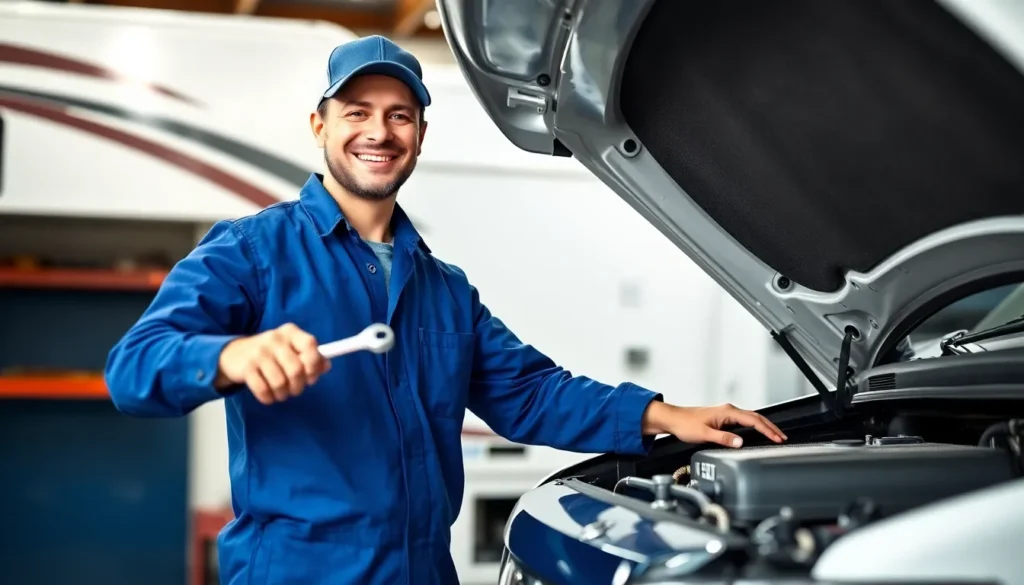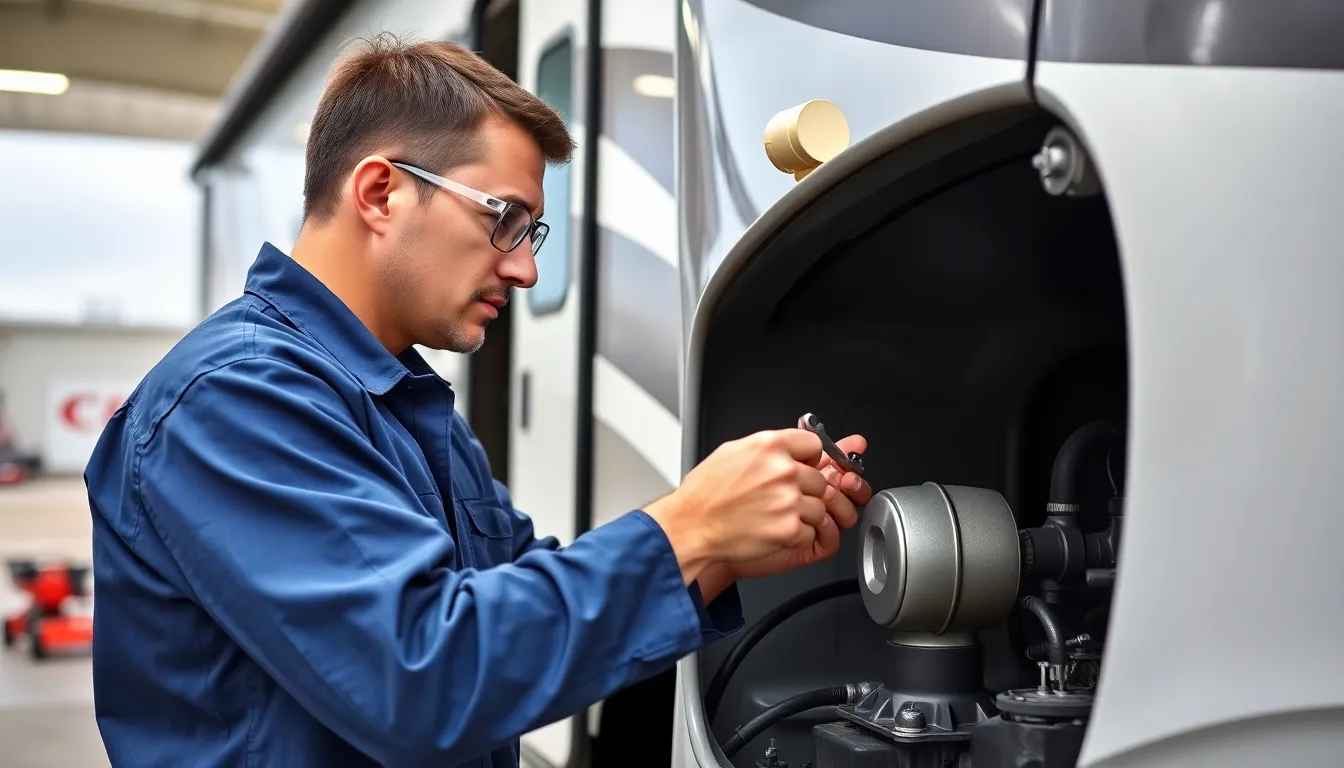
When the open road calls, nothing beats the thrill of hitting the highway in an RV. But just like a good road trip playlist, a reliable RV mechanic is essential for a smooth journey. Imagine cruising down the interstate when suddenly, your engine makes a sound that can only be described as a cat trying to sing opera. Panic sets in, but fear not! This is where skilled RV mechanics come to the rescue, armed with tools and expertise to get you back on the road in no time.
Finding the right RV mechanic can feel like searching for a needle in a haystack. With so many options out there, how do you choose someone who won’t treat your beloved vehicle like a science experiment? In this article, we’ll explore the ins and outs of RV mechanics, ensuring you can hit the road with confidence and maybe even a few laughs along the way.
RV Mechanics
RV mechanics specialize in the unique systems and components of recreational vehicles. These professionals possess knowledge about intricate systems including electrical, plumbing, and propulsion mechanisms. Expertise in diagnosing and repairing problems is crucial, as issues may arise during trips.
Routine maintenance is vital for ensuring the longevity of RVs. Mechanics offer services such as oil changes, tire rotations, and brake inspections. Proper maintenance can prevent costly breakdowns on the road.
Specialized training often accompanies RV mechanics. Many technicians hold certifications from organizations like the Recreational Vehicle Industry Association (RVIA). This certification guarantees they have the necessary skills to service a variety of RV models.
When searching for an RV mechanic, consider their experience and customer reviews. Recommendations from fellow RV enthusiasts can provide insight into reliable options. Trustworthy mechanics should also be willing to explain any repairs in detail.
Emergency repairs can be particularly challenging while traveling. Mechanics must offer quick and efficient service to minimize downtime. Access to mobile repair services can further enhance convenience for RV owners on the go.
Finding a mechanic who understands specific RV brands and models can significantly impact repair quality. Some mechanics focus on particular brands, while others offer general services. Researching local options and checking their specialties may ensure the right fit for unique needs.
Overall, maintaining a strong relationship with an RV mechanic contributes to a successful travel experience. Regular visits help establish trust and ensure that any potential issues are addressed promptly. Engaging with knowledgeable mechanics assures owners that their RVs remain in excellent condition for countless adventures.
Common RV Mechanical Issues

Various mechanical issues can arise during RV travels, especially with continued usage. Understanding these problems can help RV owners take preventive measures and ensure a smooth journey.
Engine Problems
Engine problems rank among the most common issues RV owners face. Overheating engines often stem from low coolant levels or faulty thermostats. Another frequent concern involves oil leaks, which can occur due to worn gaskets or seals. Additionally, poor fuel efficiency might indicate issues with the fuel system or spark plugs. Regular engine checks can help identify potential problems early. Mechanics recommend scheduled oil changes and inspections of belts and hoses to avoid significant engine failures.
Transmission Troubles
Transmission troubles can lead to severe road problems if left unaddressed. Slipping gears often indicate worn clutch components or low transmission fluid. Other common signs include delayed shifting, which might occur due to a failing transmission control module. Mechanics advise checking fluid levels routinely and looking for leaks around the transmission area. Neglecting transmission issues can lead to costly repairs and, ultimately, a complete transmission replacement. Regular maintenance ensures optimal performance, helping RV owners avoid unexpected breakdowns.
Essential Tools for RV Mechanics
Maintaining an RV requires specific tools tailored for its unique systems. Mechanics need reliable equipment to diagnose and repair issues effectively.
Must-Have Diagnostic Tools
Diagnostic tools play a crucial role in identifying problems. OBD-II scanners help mechanics read error codes generated by the engine’s onboard computer. Multimeters measure voltage and current, aiding in electrical diagnostics. Pressure gauges are essential for assessing fuel and oil systems, ensuring components function correctly. Additionally, brake diagnostic tools provide insights into braking system performance, which is vital for safety. These devices empower RV mechanics to pinpoint issues accurately, reducing the time spent troubleshooting.
Recommended Repair Tools
Repair tools form the backbone of any RV mechanic’s toolkit. Ratchet and socket sets facilitate quick loosening and tightening of various fasteners. Pliers and wrenches allow for further adjustments, making repairs more manageable. Torque wrenches ensure components are tightened to manufacturer specifications, preventing future failures. Screwdrivers, both flathead and Phillips, cover a wide range of tasks, from securing panels to fixing appliances. Having these essential repair tools ensures mechanics can tackle almost any job that arises during maintenance or repairs.
Finding a Reliable RV Mechanic
Identifying a dependable RV mechanic greatly enhances travel experiences. Several key factors simplify this process.
Questions to Ask Potential Mechanics
Inquire about their experience with specific RV brands. Understanding their specialization in various models can clarify capabilities. Ask for certifications or training completed, as these often reflect a mechanic’s skill level. Explore their approach to routine maintenance and repairs, ensuring they align with your expectations. Discuss response times for emergency situations; swift service is essential. A mechanic willing to communicate detailed explanations fosters trust and transparency.
Checking Reviews and References
Online reviews serve as crucial indicators of a mechanic’s reputation. Focus on feedback from fellow RV owners to gauge satisfaction. High ratings in aspects like customer service and repair efficiency indicate reliability. Additionally, requesting references from past clients helps assess past performance. A mechanic with positive testimonials builds confidence for future engagements. Engaging with local RV forums or social media groups may provide invaluable insights.
DIY RV Maintenance Tips
Regular RV maintenance enhances reliability and performance. Inspecting tire pressure monthly reduces blowout risks. Engine oil changes every 3,000 to 5,000 miles ensure optimal functionality. Brake checks require attention before long trips to avoid safety hazards.
Cleaning air filters at least twice a year improves airflow and efficiency. Testing the battery’s charge regularly prevents unexpected breakdowns. Checking hoses and belts for wear can prevent significant issues down the road.
Inspecting the roof for cracks or damage helps protect against leaks. Sealing gaps and seams with appropriate sealants preserves the RV’s interior from water damage. Maintaining the plumbing system involves flushing the water heater annually to prevent sediment buildup.
Inspect interior wiring for signs of fraying or wear to enhance electrical safety. Keeping the RV clean inside and out prevents corrosion and extends its lifespan. Storing the RV in a covered area shields it from sun damage.
Learning to perform basic repairs empowers RV owners. Familiarity with fuse replacement and light bulb changes saves time and money. Utilizing online resources or local RV clubs offers further guidance on DIY projects.
Organizing essential supplies creates efficiency for maintenance tasks. Stocking up on wrenches, screwdrivers, and lubricants prepares owners for unexpected repairs. Consulting the RV owner’s manual aids in understanding specific components and maintenance schedules.
Prioritize safety by having a fire extinguisher and first-aid kit on hand. Establishing a routine for checklists simplifies maintenance tasks and ensures nothing is overlooked. Taking proactive measures keeps the RV running smoothly for countless adventures.
Conclusion
Having a reliable RV mechanic is crucial for any successful road trip. With the right professional by their side, RV owners can tackle unexpected issues with confidence and ease. By prioritizing routine maintenance and understanding common mechanical problems, they can keep their vehicles in top shape.
Engaging with local communities and checking reviews can lead to finding trustworthy mechanics. Additionally, embracing DIY maintenance can empower RV owners to handle minor repairs and enhance their travel experience. With the right knowledge and resources, every journey can be an enjoyable adventure on the open road.








